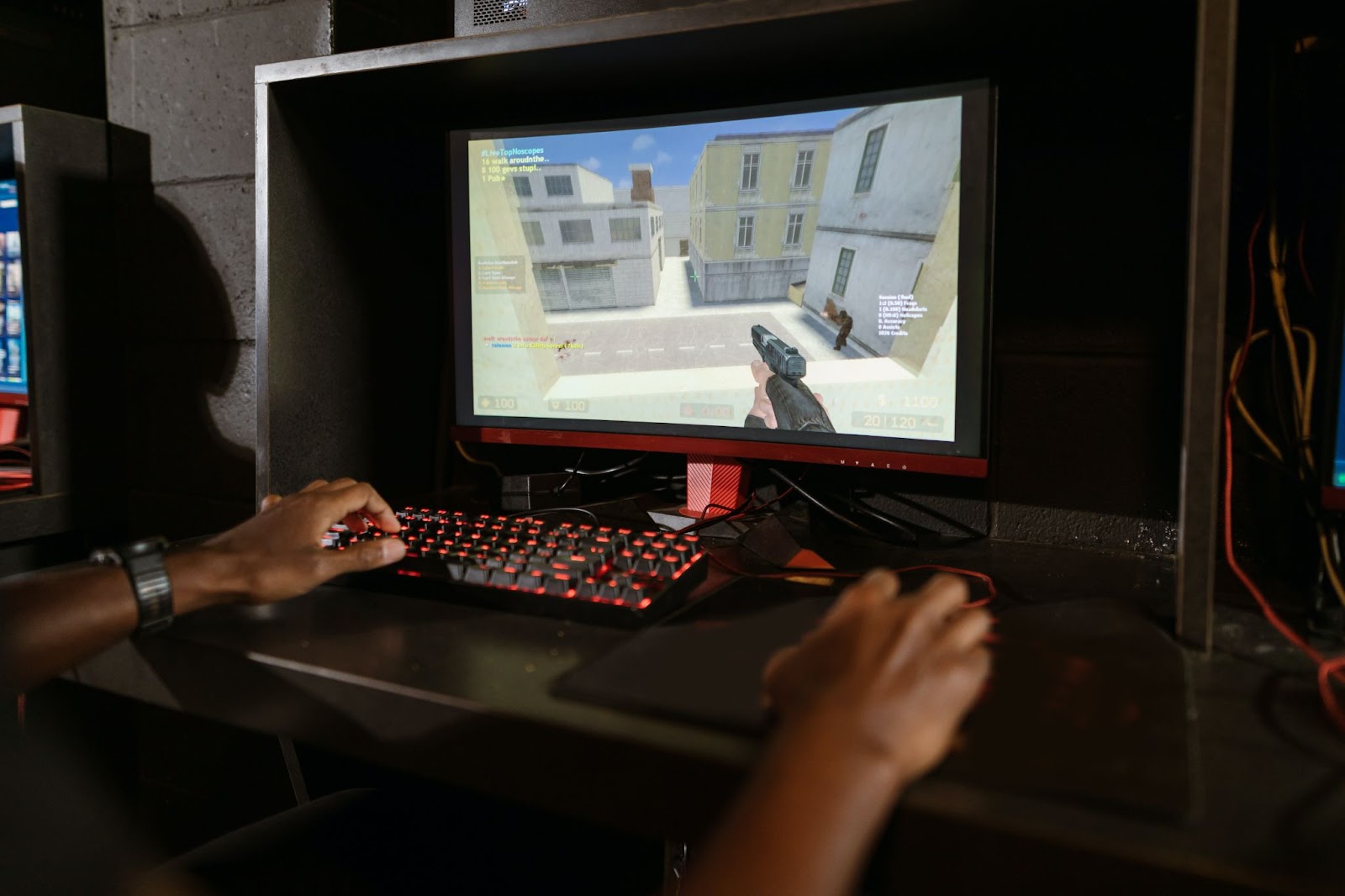
The connection between the Olympics and esports has become increasingly close as the digital gaming industry continues to grow. Esports are now seen around the world, with tournaments touching virtually every corner of the globe. To many, this connection may seem strange, but it has become a topic of discussion for some of the most prestigious sports governing bodies around the globe. With its growing popularity and wide reach, many are wondering if esports could soon become part of official Olympic Games competitions. To understand how esports and the Olympics became connected requires tracing their histories back to ancient times and examining how much they have in common on a structural level. It is important to note that although there has been some overlap between traditional sports and esports in the past, recent developments have seen greater convergence between them in recent years. On a structural level both industries have evolved over time with overlapping areas such as broadcast technology, sponsorships, competition planning, venue setup and more. For many decades esports have been a niche hobby or activity only followed by specific groups who were exposed to it from an early age or had a natural inclination towards it. While traditional sports always had worldwide recognition for their mass appeal base, oftentimes reaching into developing countries, digital gaming instead was often confined to massive gaming communities which at best made several fragmented appearances at different events on multiple continents but never really got much popular attention until relatively recently.
Does The Olympics Have Esports
The Olympic Games have a long and fascinating history, stretching back to ancient Greek times. Over the centuries, the Olympics have evolved and adapted to include a variety of sports, from running and swimming to skiing and curling.
With the rise of esports, the Olympics are now beginning to incorporate this type of competition. This article will explore the history of the Olympics and its connection to esports.
Origin of The Olympics
The Olympic Games are a multi-sport event that is hosted by a different country every four years. It was initially organized by the International Olympic Committee (IOC) in 1894 and is the oldest of all international sporting events. The Olympics were modeled on the ancient Olympic Games which were held in Athens, Greece from 776 BC to 393 AD, although some forms of sports competition have existed for centuries. The Olympics were originally held in honor of the Greek gods, Zeus and Hera. Athletic events were part of religious festivals during this time and included foot races, long jump competitions, chariot races and javelin throws. These events also provided a chance for political rivals to settle their differences without war or violence. As time progressed, the Games expanded to include various sports and soon gained international recognition. In 1896, Baron de Coubertin founded the International Olympic Committee (IOC), which organized the first modern-era global Olympics in Athens in 1896 with 14 participating nations. Over time, more competitions have been added to honor different skill sets including figure skating, artistic gymnastics and ice hockey. With each iteration of the Olympics has come more opportunity for athletes to showcase their talent across diverse disciplines and cultivate camaraderie through sport regardless of nationality or color. In recent decades, technological advancements have allowed new sports to join other traditional categories such as archery, badminton or sailing — these are now called “esports” due to their utilizing video games over physical disciplines that do not require traditional methods such as running or swimming for victory. Esports first appeared as an official medal event at the Asian Indoor & Martial Arts Games in 2017 and made its debut at medals tournaments with six different titles at The 2022 Asian Games — this signifies a groundbreaking moment within esports culture worldwide where elite players can compete against one another on global stages such as those offered by major organizations like the IOC who aim to celebrate sport’s highest level performances all around the world year after year.

Evolution of The Olympics
The Olympics have been through many changes since its first modern incarnation in Athens, Greece in 1896. The International Olympic Committee (IOC) was founded in 1894 and is the governing body of the World’s Olympic Games. Since the founding of IOC, major leaps forward in technology and advances in understanding sports science have impacted greatly on how sports are organized, trained for, and competed at an international level. Such changes have seen the Olympic Games evolve from a simple gathering of top athletes to a spectacular event showcasing physical prowess on an unprecedented scale. Major developments over time have included:
- 1908 – Opening of London’s Wembley Stadium with world’s first electronic scoreboards
- 1948 – Introduction of television broadcasts at the London Olympics
- 1964 – Inclusion of women’s events
- 1984 – Enhanced television coverage worldwide
- 1996 – Internet coverage with websites devoted to tracking athletes and results
- 2020 — First inclusion of Esports as a demonstration event during Tokyo Summer Olympics
History of Esports
Esports have seen a surge in popularity in the past decade, with millions of viewers tuning in to professional tournaments and competitions. While esports have only started to gain a foothold in the Olympics in the past few years, their history stretches much further. In this article, we’ll explore the history of esports and its connection to the Olympics.
Origin of Esports
Though more and more people are aware of esports, a comparison to the Olympics might be seen as a stretch for some who find little resemblance between the two competitions. But the relationship between the two forms of competition is in fact strong, with each having its own unique contribution to global sporting culture. The origins of esports can be traced back to the 1970s, beginning with video game tournaments at arcades and popular games such as Space Invaders and Pac-Man. Many popular sports franchises sought to get in on this emerging trend by creating their own championships. It was during this time that we started to see what we recognize today as esports, organized competitive tournaments between professional players with lucrative prize pools. Of course it wasn’t always seen so positively — historically attuned authorities were wary that esports would lead to increased levels of gambling and violence among participants — but times have since changed and competitive gaming is now widely accepted as a legitimate form of sport entertainment. As esports grew in popularity it found itself increasingly linked to traditional sports through their shared ethos of fair play and spirit of friendly competition. This connection was further strengthened when Blizzard Entertainment struck up a partnership with The Olympics International Committee in 2016 organising an invitation-only Hearthstone tournament alongside Summer Games which allowed athletes competing in various events at Rio De Janeiro over that period an opportunity to qualify for it through regular online qualifiers taking place throughout the year prior. This recognition from mainstream sports organizations has given legitimacy to esports athletes worldwide and created an environment where gamers have been able become recognizable within their own communities amidst much fanfare and support from both local teams & players along with international governing bodies alike – thus furthering extending & solidifying its ties with traditional sporting ideals & culture from all around the globe paving way for new pathways into unexplored markets while still honouring its core value system that started back when gaming circles first emerged out of obscurity generations ago – fostering strong relationships between gaming enthusiasts everywhere regardless background or national origin.
Evolution of Esports
The world of esports has come a long way since it first started gaining traction in the early 1970s. With today’s advances in technology, this form of digital competition has grown increasingly popular among professional and amateur gaming enthusiasts alike. As with any sport, the rules and regulations for competitions have also evolved over time. From its humble beginnings as a hobby enjoyed by a few college students, esports gained traction through the 1980s and ’90s with first-person shooter games such as Quake, Doom and Counter-Strike. In 2000, the World Cyber Games was established to bring together competitive gaming teams from around the world. After global events such as the 2002 WarCraft III World Championships in South Korea and Intel Extreme Masters launched in 2006, Esports’ popularity began to accelerate quickly worldwide. Major tournaments now boast six-figure prize pools and dedicated fan bases across all gaming genres including battle royale titles like Fortnite or shooters such as Overwatch or Call of Duty: Modern Warfare. In 2018, esports were officially considered a medal event at Asian Games after demonstrations occurred at 2017 AIMAG (Asian Indoor & Martial Arts Games). This marked an exciting milestone for esports –not only did this provide greater visibility for competitive gaming communities but also helped to solidify its status within mainstream sports culture. Today’s bustling Esports industry is still rapidly growing – giving aspiring eSport competitors plenty of opportunities to make their mark on what has become one of the most popular spectator sports globally.
The Connection Between The Olympics And Esports
In recent years, esports have become mainstream with millions of players and fans around the world. As the esports industry continues to grow, more organizations, including the International Olympic Committee (IOC), have begun looking into the possibility of including esports in the Olympics.
In this article, we’ll discuss the potential connection between the Olympic Games and esports.
The IOC’s Response to Esports
Esports is a rapidly growing industry with the recent admission to the Asian Games as an official event and the promise of an Olympic medal potentially only a few years away. It’s an industry that has often sparked debate, both in general discussion and particularly within the International Olympic Committee. The IOC’s response over the years has seen it constantly modify its stance, adapting as technology and public opinion progress. Initially, IOC President Thomas Bach expressed caution when discussing esports’ potential inclusion at the Olympics in 2017 but has since changed his tune and welcomed discussions on top of creating ‘a dialogue process’ with game publishers. In 2019, for example, he highlighted changes that could be made to certain games in order to make them acceptable for participants including no reward system based on violence in which case NBA2K or FIFA may possibly earn a flight ticket to Tokyo 2020. However, whether these changes would be enough to usher esports into inclusion amongst traditional sports remains to be seen as other challenges like game publishers refusal towards backing of any sport acknowledgment or their multimillion dollar prize pools working against IOC development remain points still encountered today.

Potential For Esports in The Olympics
Due to its immense popularity, esports has been suggested as a potential addition to the Olympic Games. While there is still much debate about the inclusion of esports in the Games, there are a few key points worth considering in regards to its possible integration:
1. The profile of esports has grown exponentially in recent years. Esports is already one of the fastest-growing industries on a global scale, and its presence within traditional sports organizations such as the Asian Games and global organizations like the IOC (International Olympic Committee) underscore its relevance and importance.
2. With an estimated global revenue of $1 billion by 2021, esports has proven it can be profitable for both users and investors alike. For that reason, many believe that it could benefit both athletes and Olympics sponsors if included in the program.
3. The potential for professional athletes to represent their country on an international stage is a powerful aspect that brings attention not only to Olympic sports but also promotes national pride. Esports gives fans around the world an opportunity to participate through competitions such as The International or League of Legends Worlds which pit teams from different countries against each other with millions of viewers watching online or at stadiums worldwide.
4. In recent years major broadcasting networks such as ESPN have begun broadcasting top-tier events leading more people than ever before to familiarize themselves with what’s going on inside gaming communities—a perfect precursor for esports entering into traditional sports organizations like the Olympics where recognition goes hand-in-hand with success across all fields of athletics.
5. Giving pros from all types of games equal access regardless of age or gender could help create real change within a growing industry like esports by educating fans about diversity and inclusion—exactly what’s expected from athletes taking part in Olympiad today! Plus, young gamers today may get creatively inspired by professional players around them, inspiring actions such as school clubs or activities specifically designed for children who are interested in gaming (nurturing future pros).
Conclusion
For the Olympic Movement, the connection between esport and traditional sport provides a unique opportunity to further its mission. Organizations such as the IOC and Olympic host cities can benefit from engaging with esports by leveraging the popularity of digital games, competitions and activities. Furthermore, esports’ vibrant competitive nature allows it to continue to grow in reach and influence on an international level. The collaborative approach utilized by both traditional and esports organizations presents a path forward that has potential to revolutionize how sporting events are organized around the world. As traditional sports face a global decline in young fans, esports could provide a viable solution to attracting new audiences towards its offerings. This presents an exciting opportunity for more comprehensive partnerships between traditional sports organizations that would create lasting memories for all participants. Whether playing or watching sport of any kind – physical or digital – fans around the world can look forward to celebrating competition even more through engagement with esports in upcoming Olympic Games.




